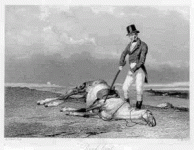There was a war. A Civil War. Lincoln was trying to pull the union back together for a number of reasonsnot the least of which was his desire to be reelected. The abolishment of slavery was a cause that was popular in the North where a vast majority of the voters lived, but many statesmen were just as willing to let the question of slavery be a states right although they finally had to jump on the band wagon to help justify the Union invading the South. Lincoln and his Secretary of War...I think Stephens or something similar to that name thought the South had no backbone for fighting and that a few skirmishes at the offset would bring the South to its knees and back into the Union and were also just as willing to let slavery remain a states right to prevent an all out war. But when the South failed to roll over and actually kicked a lot of Yankee butt with little or no army, weapons and uniforms to wage war or anything else other than a strong will, they realized a war was inevitable. When Lincoln first went to war and for at least the first two years of the war he couldn't find a leader who was actually competent and willing or capable of mounting an offensive. Generals were mostly political appointees and were incompetent. Heads rolled by the numbers until true military leaders like Sherman and Grant rose to the top. The same could be said of the South to a lesser degree, therefore contributed to the early on victories attained by the South. The South could have ended the war a couple of times by invading and capturing Washington D.C., but they always seemed to fail to follow up and pursue the enemy when a victory was won, thus giving the North the time and opportunity to rebuild its armies, improve its weaponry and supplies and conscript many times the number of forces than the South could ever muster. At first the main if not only advantage other than sheer will was that the South had a very good railway system to move troops and supplies about. This was because the South provided much if not most of the raw materials for the North's Industrial base. Nearly every little Southern town or city had a railroad connection to ship raw goods to major cities and trade centers. The North had much better roads, but of course the railroads were much faster in moving troops and equipment even in bad weather, and until the southern railway system was destroyed the South could usually remain a half step ahead of the North. As an example, when a campaign was began against a southern City, Atlanta as an example, the railroads that would assist the north were first destroyed and damaged by the South leaving only supply lines open into the city mainly from the south that could be easier to protect and ship men and supplies into the city and by the same token, keeping the North from using the destroyed lines to aid their invasion. The North got to taking vast numbers of engineering companies to restore the railroads for their advantage. Meanwhile Sherman side slipped around Atlanta until he was able to shut off the supply lines by destroying the inbound rails.
And again I am getting wound up way too much and straying off topic! Perhaps those readers who are not Civil War buffs can get a better understanding of what was going on by my meandering? I hope so. Monty





 as for if no discussions then no one is reading them and their would not be a great site like this
as for if no discussions then no one is reading them and their would not be a great site like this 

